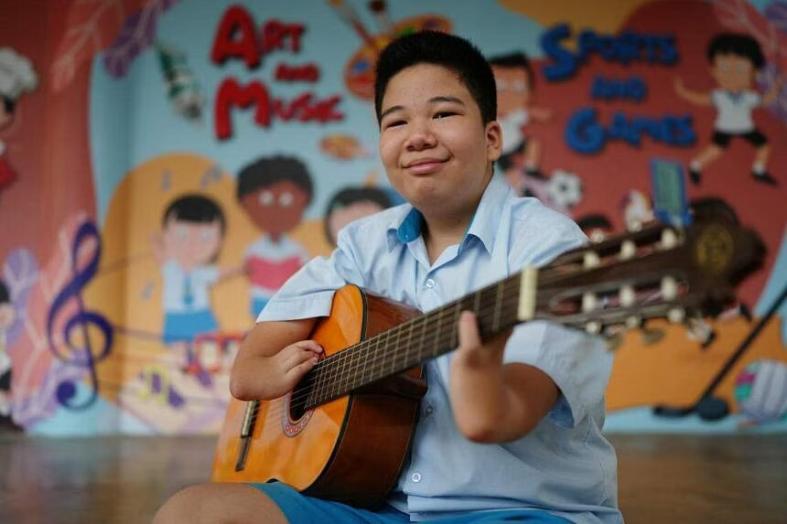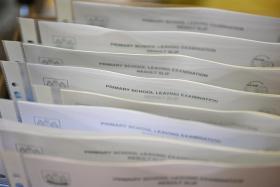Boy born with hand deformities perseveres in PSLE journey
Born with radial clubhand, a deformity that resulted in both his forearms being perpendicular to his wrists, Ean Chan Yi An, 12, had to undergo therapy at KK Women’s and Children’s Hospital at age five to learn how to hold a pencil.
Despite his initial struggles, the Park View Primary School (PVPS) pupil has seized every opportunity to learn new things.
In Primary 5 and 6, Ean took part in a floorball competition during his school’s Sports Day. After learning how to play the guitar in Primary 5, he was chosen to be part of an ensemble to perform during Teachers’ Day celebrations.
Ms Pamela See Yuen Heng, upper-primary assistant year-head at PVPS, said that despite his physical limitations, Ean has never used it as an excuse to submit late and untidy homework.
“You know how difficult Chinese characters are to write, not like ABC. But Ean’s handwriting is neat and tidy. Compared to an able person, you won’t believe that this is his handwriting,” she noted.
Ean was one of 38,088 pupils who took the Primary School Leaving Examination (PSLE) this year. Similar to last year, 98.4 per cent of the batch did well enough to progress to secondary school.
Of the four madrasahs offering primary education, 335 out of 338 Singaporean Primary 6 pupils passed their PSLE this year, said the Islamic Religious Council of Singapore.
This is the third year the PSLE is held under the new Achievement Level (AL) scoring system.
Starting from next year’s Secondary 1 cohort, full subject-based banding will be implemented in the secondary education system along with the removal of the Express, Normal Academic [N(A)] and Normal Technical [N(A)] streams.
The Ministry of Education will post students to secondary school through three posting groups – 1, 2 and 3 – mapped from the N(T), N(A) and Express standards respectively. In secondary school, they will be grouped into mixed form classes comprising students from the three posting groups.
Students can take subjects at three subject levels, known as G1, G2 and G3 (G stands for General), mapped from today’s N(T), N(A) and Express standards respectively.
Eligible students can study English, mother tongue languages, mathematics and science at a more demanding level based on their PSLE AL for each of these subjects.
After Secondary 1, students may also take these subjects at a more demanding level based on their performance.
For the 2023 Primary 6 cohort, about 64 per cent eligible for posting groups 1 and 2 are suitable to take at least one subject at a more demanding level. This is comparable to last year’s cohort eligible for the Normal courses.
After receiving his results, Ean said he is happy that he got into posting group 3 and that he managed to score AL 2 – the second-best grade – for his favourite subject, mathematics.
He added that his parents helped him prepare for the PSLE by not making him stressed about how many hours he had to study each day. They also taught him how to deal with people who might stare at him because of the condition of his hands.
“Now, when people stare at me, I will turn to them and smile. Maybe they’re just curious about why my hands are like this,” said Ean.

When asked what he will miss about PVPS, he added that he will miss his friends and teachers. He recounted an incident when his classmate of four years, Jaime Wong, 12, offered to carry his food to a table during recess.
“I have learnt that there are a lot of kind people in this world. I am very thankful to my teachers and friends, as they have journeyed with me for the past six years.”
A firm believer in the concept that every problem has a solution, he looks forward to pursuing a career in technology where he can develop smart solutions for people with disabilities.
Said his mother, Madam Christine Wong, 50, a pre-school educator, of her only child: “Ean has matured a lot these past six years. He can do most things independently, and he can handle stressful situations on his own.”
Get The New Paper on your phone with the free TNP app. Download from the Apple App Store or Google Play Store now

